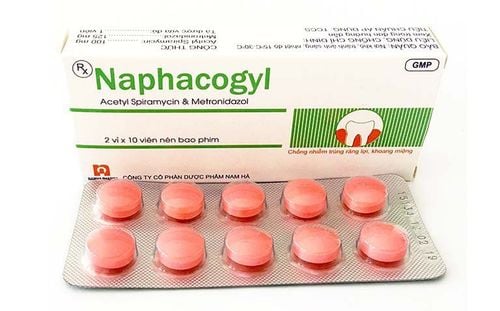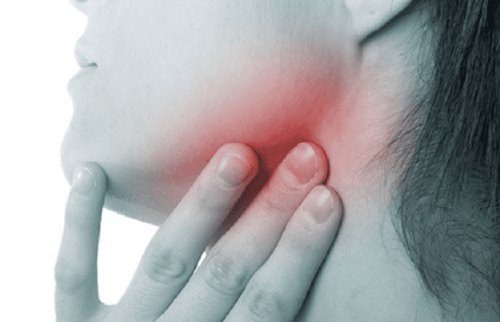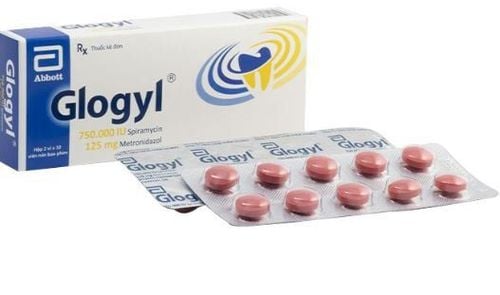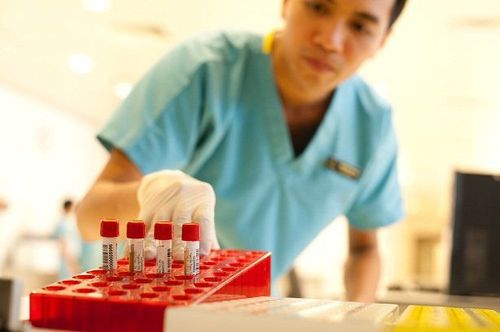This is an automatically translated article.
Some ENT diseases can affect the parotid salivary glands, leading to symptoms of swelling in the parotid. The disease may be mild and clears easily after a few days, but there are also conditions that cause swelling of the parotid gland that require surgery or chemotherapy. So swollen parotid but no fever, why?
1. Causes of swelling in the parotid 1.1. Salivary gland stones A common cause of parotid swelling without fever is stones. The cause is a blockage of the salivary glands and causes the parotid to swell, which is a stone. Salivary gland stones are defined as calcium and phosphate blockade at the outlet of the salivary glands in the oral cavity. Large stones can block the salivary glands, cause inflammation, and even abscesses.
To definitively diagnose salivary gland stones, doctors will appoint X-rays or CT - scanners. In the early stages of the disease, salivary gland stones usually cause no symptoms, but if they reach the size of the salivary ducts and cause a blockage, saliva overflows into the glands, causing pain and swelling in the parotid. You may feel the pain come and go, then the pain gets worse, inflammation and abscesses follow.
1.2. Simple parotiditis Inflammation of the parotid glands simply causes swelling in the parotid. Causes of the disease can be mentioned as: Staphylococcus aureus, Parainfluenza, coxsackie... cause.
At the same time, inflammation of the parotid salivary glands can form stones, block ducts, and cause inflammation. This disease usually only causes lesions at the salivary gland site, benign course, most of which resolve spontaneously after a short time. Occasionally, there are cases of chronic inflammation of the gland.
Characteristic signs of simple salivary gland inflammation
Swelling in parotid salivary gland area, swelling spreading around the gland; The skin in the glandular area is swollen with redness, pain, when the mouth muscles are active, speaking and swallowing are very painful; Presence of reactive inflammatory lymph nodes at the angle of the jaw or behind the ear on the same side; Moderate fever from 38-390C; Pressing on the parotid gland with your hand will see pus draining out of the mouth of the Stenon tube.
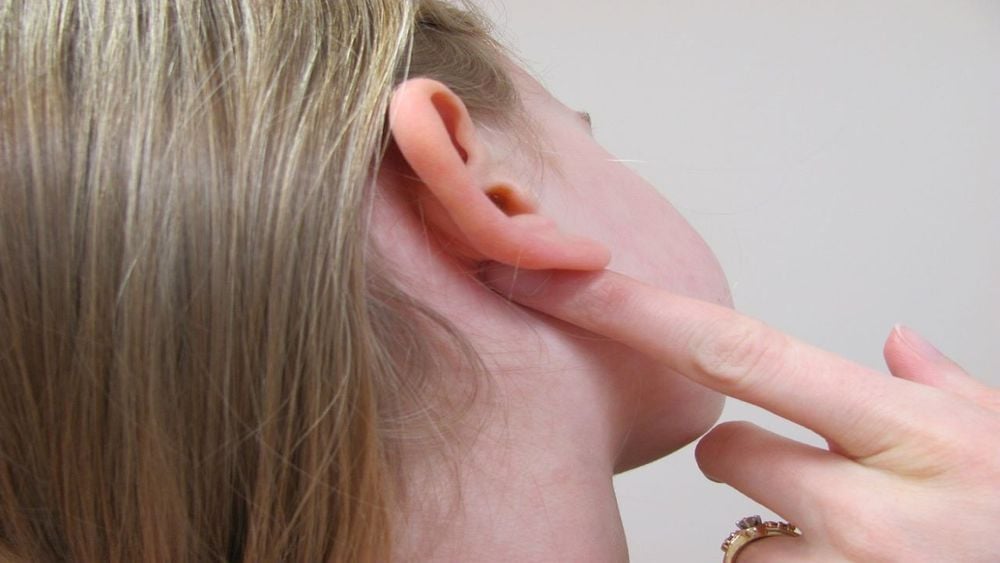
Sưng mang tai nhưng không sốt có thể do viêm tuyến nước bọt đơn thuần
1.3. Mumps When the parotid salivary glands become inflamed caused by the mumps virus, it is considered mumps. However, the rate of parotitis caused by mumps virus only accounts for about 24% of the total causes of parotid gland disease.
Characteristic clinical signs:
High fever from 38 - 39oC after exposure to mumps virus about 14 - 24 days; Headache, fatigue, loss of appetite; Difficulty eating, swallowing, talking, pain in joints. Swelling in the parotid, spreading to the area in front of the ear and down to the jaw. Swelling may spread to the chest causing presternal edema. The skin in the swollen area has a normal color, is not hot and red, and is still elastic. When infected with mumps, the parotid gland usually swells gradually for about 3 days and then gradually decreases in about 1 week. Other comorbidities such as orchitis, meningitis, encephalitis, acute pancreatitis, laryngotracheitis, interstitial pneumonia, polyarthritis or manifest in other glands in the body such as lacrimal gland, lacrimal gland thymus, thyroid, mammary glands, ovaries. These lesions often present with atypical symptoms and have a benign course.
1.4. Salivary gland tumors Several different types of tumors can affect the salivary glands and cause parotid swelling without fever. The majority of salivary gland tumors are benign and are usually found in the parotid glands, most commonly adenomas of various sizes. Multiple adenomas are usually present on only one side. The tumor grows slowly and may not show any symptoms. Quite rare cases are granulomatous, basal cell tumors.
1.5. Malignant (cancerous) tumors These may include squamous cell carcinoma, squamous cell carcinoma, or adenocarcinoma. Unlike benign salivary gland tumors, malignant tumors can grow rapidly, causing swelling of the parotid but no fever or pain to the touch. Tumors may adhere to surrounding tissue, which may cause mild paralysis or paralysis of the facial nerve.
1.6. Sjogren's syndrome Sjogren's syndrome is a chronic autoimmune disease in which the body's immune system attacks exocrine glands, including the salivary glands.
Clinical signs of Sjogren's syndrome include:
Signs of parotid swelling but no fever and no pain. Decreased salivation can lead to bad breath, difficulty speaking, difficulty chewing and swallowing, and decreased or lost taste. Inflammation of the gums or tooth decay is also more common. Conjunctivitis, eye inflammation caused by the lacrimal gland is infiltrated with lymphocytes and plasma cells, thus reducing tear secretion leading to dry and red corneal conjunctiva. Appears itching, burning in the eyes, lumpy feeling and increased sensitivity to light. Complications of eye ulcers in more severe cases. Nose, pharynx, bronchial tubes, skin, and vagina may also experience dryness of the mucous membranes similar to those of the eyes and mouth.

Sưng mang tai nhưng không sốt có thể do bệnh quai bị
2. How to prevent swelling of the parotid disease Swelling in the parotid has extremely dangerous complications to health. To prevent dangerous diseases as well as protect your health, you need to note a few things as follows:
Need to keep the body warm when the weather turns cold, especially the neck area; Exercise regularly to strengthen immunity, improve resistance and protect the body against agents such as viruses, bacteria; Building a scientific, healthy lifestyle, a diet full of essential nutrients for the body; Eat foods rich in vitamins and minerals to supplement the body's nutrition; Drink plenty of water, add fruit juice daily; Do not drink cold water, fried foods and hot spicy spices; No smoking; Do not use alcoholic beverages such as wine, beer; Infants should be breastfed until 24 months of age; Parents need to create a habit of keeping their children's body hygiene to protect their health. If you are showing signs of swelling in the parotid or other ear, nose and throat problems, you should seek medical attention immediately. Swelling in the parotid without a fever can be a sign of a serious illness. Therefore, to protect your health, you must not be indifferent to your own abnormalities, but should go to the doctor for timely detection and treatment.
Vinmec International General Hospital is a general hospital that has the function of examining and treating ENT diseases such as sinusitis, rhinitis, allergic rhinitis, chronic rhinitis, tonsillitis, and pain. throat, tinnitus and many other diseases. At Vinmec, we have also performed endoscopic diagnosis and treatment with modern medical methods for ear, nose and throat diseases, which not only brings high efficiency but also minimizes complications of recurrent disease. The great success is because Vinmec is always fully equipped with modern facilities, examination and treatment procedures are carried out by a team of experienced and qualified doctors that will bring about treatment results. optimal for customers.
Please dial HOTLINE for more information or register for an appointment HERE. Download MyVinmec app to make appointments faster and to manage your bookings easily.




